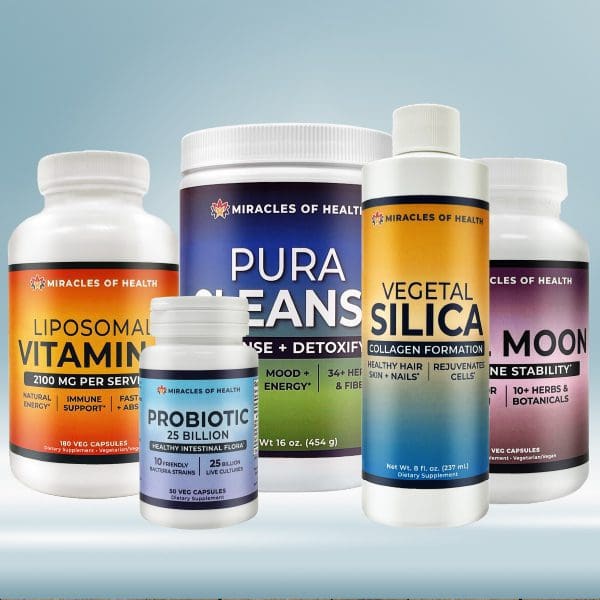Many people diagnosed with autoimmune disease will take medication prescribed by their physician without further thought. They are band-aiding the symptoms of the disease instead of truly healing the body so that they can find their best level of health.
When we look at autoimmune diseases such as Graves, Crohn’s, celiac, Hashimoto’s, Rheumatoid Arthritis (and also common autoimmune diseases like acne and IBS) from a holistic perspective, it’s imperative to understand the most common triggers so that we can focus on making better choices for our health.
Here is a list of the Top 7 Triggers of Autoimmune Disease
There are more triggers and underlying causes of autoimmune diseases, but these are some of the most prevalent.
#1. Gluten
Gluten is a protein found in wheat, spelt, oats, barley and rye. Mark Hyman famously wrote about gluten. His article – “What you don’t know might kill you”, is about this damaging autoimmune irritant. In pre-industrialized days, gluten didn’t harm as many as it does today because the preparation of the grain was very different and the inflammatory protein was more gentle by the time we ingested it. Today’s processed grains are highly inflammatory and eaten at nearly every meal by the vast majority of us.
#2. Sugar
Sugar dysregulation is one of the most common causes of digestive dysfunction, wreaking havoc on the immune system and potentially triggering autoimmune disease. Blood sugar imbalances also contribute to leaky gut syndrome, a perforation in the lining of the digestive tract whereby food particles can leech into the bloodstream and cause severe inflammation. This adds to an already weakened immunity by compromising the release of cortisol – which helps to regulate our blood insulin levels.
Spiking the blood insulin levels with sugar constantly creates a merry-go-round of negative effect, adding to the propensity of worsening or triggering autoimmune disease.
#3. Stress
Studies have shown autoimmune disease flares when chronic stress reduces the effectiveness of cortisol regulating the inflammatory response. The cells of our immune system can become insensitive to cortisol’s regulatory effect, leading to inflammation and triggering the development of autoimmune disease.
Over 90% of our happiness hormones are created in our digestive system. When we upset our digestive system with a poor diet, we can also experience brain fog, pain, fatigue, poor sleep, anxiety, or endocrine dysfunction exasperating our feelings of stress and not recognizing this as coming from our digestive system.
#4. Dairy
The milk protein casein, found in all dairy products, can cause inflammation in the digestive tract and trigger autoimmune disease. Dairy sugar lactose causes digestive inflammation in a large percentage of adults – most of them unaware of it – triggering autoimmune disease in the process. Most people past the age of being weaned as a baby, lack intestinal lactase which digests the lactose in dairy.
While it is best to completely remove dairy from the diet of autoimmune disease sufferers, some people can re-introduce fermented dairy, some full fat yogurts, kefir and clarified dairy such as ghee.
#5. Hydrolyzed oils
Autoimmune diseases are exasperated by the consumption of hydrogenated vegetable oils or trans-fatty acids from the usage of hydrogenated oils. In the USA currently, nearly 35-40% of the total calories consumed come from dietary fats of lipid origin. Hydrogenated oils (those which are treated with hydrogen to prolong shelf life) are known to increase inflammation in the body, leading to a weakened immune system.
#6. Unbalanced microbiome
A large portion of our immune system resides in our microbiome. Think about the microbiome as a village inside our bodies teaming with trillions of bacteria all working together to try to create harmony and health within our body. Our microbiome also controls the output of over 90% of the hormones we create that control our brain and emotions (such as serotonin, the ‘happiness’ hormone). It is more than likely that sufferers of depression also have some form of autoimmune condition, driven by the imbalance in the microbiome. Unbalanced microbiome can be affected by infection, use of prescription or recreational drugs, poor diet and stress.
#7. Environmental toxins
Most people are exposed to astounding amounts of pollution today. Over 80,000 synthetic or toxic chemicals have been introduced into our society since 1900, and only 550 of these have been tested for safety. According to the US Environmental Protection Agency (EPA), about 2.5 billion pounds of toxic chemicals are released yearly by large therapeutic facilities. And 6 million pounds of mercury are poured into our air every year. Many of the foods we eat are preserved using chemicals tested to a “safety” point of ingestion, yet not in consideration of the amount of other or the same chemicals we ingest in the one meal or single day.
Cleaning agents, pest control, and pollution are all adding to the workload our body has to undertake in order to remain in good health.
What can we do?
People who suffer from autoimmune disease should seek holistic support and research powerful nutritional healing practices such as adopting an anti-inflammatory, antioxidant eating strategy aimed at decreasing inflammation and promoting a healthy immune balance. We then need to add whole, clean food, nutrients, exercise, stress management, clean water and oxygen, a sense of community, connection, and meaning. Only then will we see a real decrease in autoimmune disease and its effects on health.














